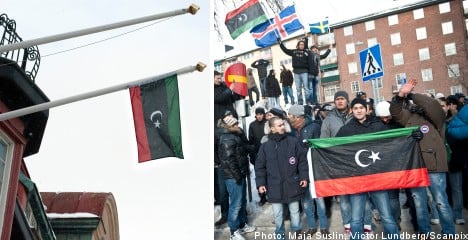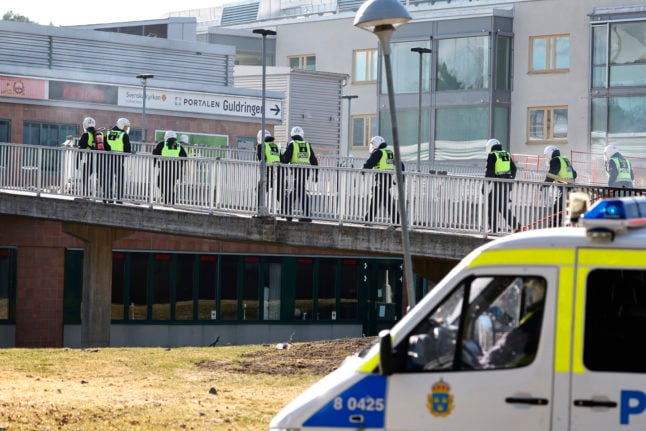A delegation of three people from among a group of protesters gathered outside Libya’s embassy on Valhallavägen in Stockholm entered the embassy on Tuesday afternoon.
The group presented demands to the embassy’s second-in-command that Libya’s independence-era flag, which has become a popular symbol among anti-government protesters, be raised outside the Libyan mission in Stockholm.
Other demonstrators braved the falling snow to gather outside the embassy, with one many standing high on a pile of snow waving the flag of Libyan independence, which was the country’s official flag from 1951 until 1969 after the country gained independence.
Also known as the flag Kingdom of Libya, it consists of a white crescent-and-star on a triband red-black-green design.
Between 50 and 100 protesters had gathered in the central Stockholm square Sergels Torg earlier Tuesday shouting “Down with the dictator!” and “Qaddafi, murderer!”, before marching to the embassy to replace the current all-green flag.
The red, black and green flag was raised shortly before 3pm to thunderous applause from onlookers, some of whom in their enthusiasm threw their arms around the deputy ambassador, the TT news agency reported.
“We did this because it was a condition set by the demonstrators before leaving,” explained an embassy secretary to the AFP news agency and a few other reporters through a cracked door.
“But the ambassador has not resigned,” he insisted.
Earlier in the day, a tearful demonstrator attempted to scale the walls of the building to hoist the independence-era flag, but was stopped by police and other protest leaders.
Shaban Elgale, a Libyan-exile and spokesperson for the Libyan Action Committee in Sweden, said that Tuesday’s demonstration includes tougher demands than the one arranged on Monday.
“Yesterday we got the embassy to raise the green Libyan flag; today we want them to raise the independence-era flag,” he told the TT news agency.
One of the demonstrators, Palestinian-born Libyan national Walid, said that Colonel Muammar Qaddafi’s appearance on Monday night shows that the leader is shaken.
“He’s scared. He’s never spoken for such a short time before, his speeches usually always last two hours. I don’t think he’s still in Libya,” Walid told TT.
On Monday, three non-diplomatic employees at the embassy announced in an open letter that they were quitting to protest the bloody crackdown on demonstrators in Libya, which human rights groups say have so far cost up to 400 lives.



 Please whitelist us to continue reading.
Please whitelist us to continue reading.
Member comments